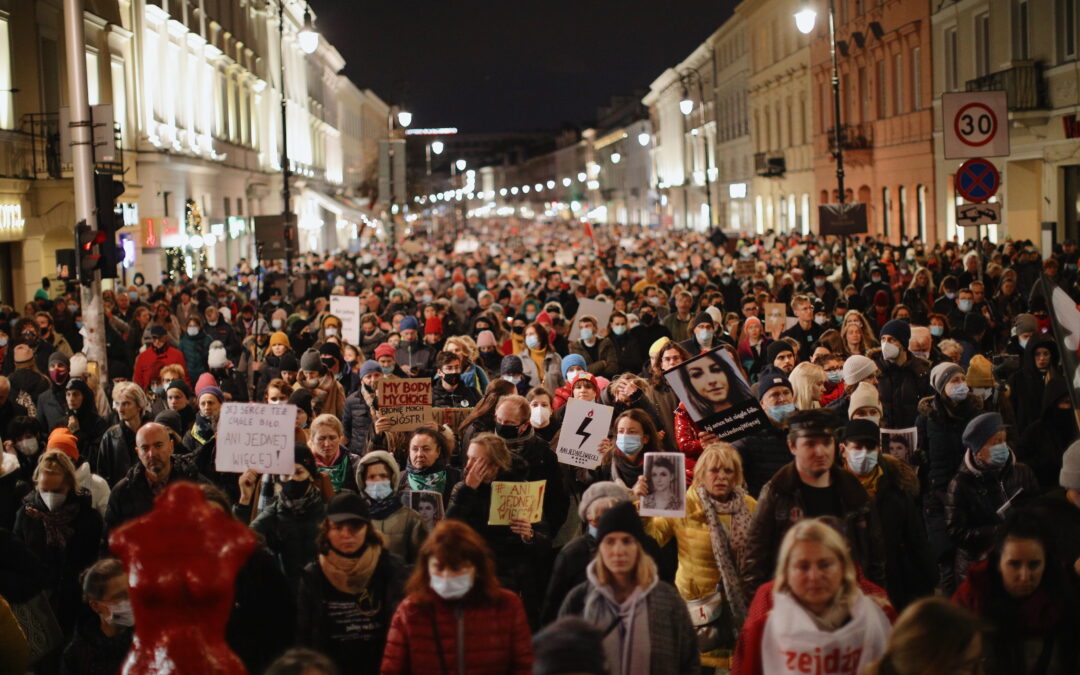A large majority of people in Poland want the country’s abortion law – which is one of the most restrictive in Europe – to be liberalised, a new poll has found. The findings follow similar results in previous surveys.
They come amid mass protests over the death of a pregnant woman in hospital, which many have blamed on last year’s introduction of a near-total ban on abortion. Some conservatives, however, have argued that the tragedy resulted from medical malpractice and was unrelated to the abortion law.
For more on the story, see our report from earlier this week https://t.co/5hQss5UVTI
— Notes from Poland 🇵🇱 (@notesfrompoland) November 6, 2021
In the new poll – which was conducted on Friday by United Surveys for Wirtualna Polska, a leading news website – almost three quarters of respondents said that they want the current abortion law to be softened.
That includes 42.8% who would like to return to the situation before the October 2020 constitutional court ruling which introduced the near-total abortion ban. The decision outlawed terminations due to the diagnosis of birth defects, resulting in Poland having the EU’s most restrictive law apart from Malta’s.
Under the previous status quo – often called the “abortion compromise” in Poland, but which was already one of Europe’s toughest laws – terminations were allowed only if a pregnancy resulted from a crime (such as rape), if it endangered the mother’s life or health, or if birth defects were detected.
A further 31.1% of respondents said that they want abortion to be allowed on demand up to the 12th week of pregnancy. That would mean introducing a law more liberal than the previous status quo and more in line with other European countries.
Only 10.4% said that they do not want any changes to the current law, while 5.2% would like it to be restricted even further (which would involve banning abortion in cases of rape and/or a threat to the mother’s life). A further 10.5% said that they have no opinion.
Even among supporters of the national-conservative ruling Law and Justice (PiS) party, which has supported restricting the abortion law, 28% want a return to the previous status quo and 14% favour abortion on demand. Just 17% are satisfied with the current law, while 14% want it tightened further.
The findings conform with previous polling showing that the largest section of society favoured the pre-October 2020 “compromise”, while among the remainder there was much stronger support for liberalisation than further restriction. However, since the near-total ban was introduced, support for legal access to abortion has increased.
The introduction of that ban last year set off the largest demonstrations in Poland’s post-communist history, with hundreds of thousands of people taking to the streets.
The emergence last week of news that a 30-year-old woman, named only as Izabela, had died after doctors waited for her foetus, which had been diagnosed with birth defects, to die before removing it, has triggered a further wave of anger.
Tens of thousands gathered in Warsaw and other cities under the slogan “Not one more” (Ani jednej więcej). Among them were a number of opposition politicians, including Donald Tusk, leader of the largest opposition party, who has blamed Izabela’s death on the government “selling itself to a religious sect”.
Many conservative figures have, however, argued that the tragedy has nothing to do with the abortion law, which they note still allows for pregnancies to be terminated if they threaten the health or life of the mother.
They say that Izabela’s death was the result of medical malpractice or simply an unavoidable tragedy. State television, which is a mouthpiece for the government, yesterday accused the opposition of playing “a political game with a tragic death”.
One of its commentators explained that “tragedies happen; we will never live in an ideal world”. Earlier this week a senior PiS MP likewise said that Izabela’s death had “nothing to do with” the abortion law: “the fact that people die is biology, and unfortunately sometimes women die in childbirth.”
W TVP Info dzisiaj narracja, że protesty #anijednejwiecej są nieludzkie, nieracjonalne, moralnie odrażające, zakłamane i antypaństwowe.
Karnowski: "Tragedia się zdarzyła, no tragedie się zdarzają, nigdy nie będziemy żyć w świecie idealnym". pic.twitter.com/lYaSxMCHNb— Kalina Błażejowska (@KBlazejowska) November 6, 2021
The new poll also found that 57.9% of respondents favour holding a referendum to decide on Poland’s abortion law while 36.5% are opposed to the idea.
The possibility of such a referendum was advocated this week by Szymon Hołownia, leader of the centrist Poland 2050 (Polska 2050), which is the second most popular opposition group according to polls.
Speaking to Polsat News on Friday, Hołownia – a devout Catholic – said that he would not attend Saturday’s protests because they should be “based on the power of citizens” and not turned into a “political show”. He then added that “the solution to this issue should be a referendum”, as happened in Ireland.
Main image credit: Dawid Zuchowicz / Agencja Wyborcza.pl

Daniel Tilles is editor-in-chief of Notes from Poland. He has written on Polish affairs for a wide range of publications, including Foreign Policy, POLITICO Europe, EUobserver and Dziennik Gazeta Prawna.




















